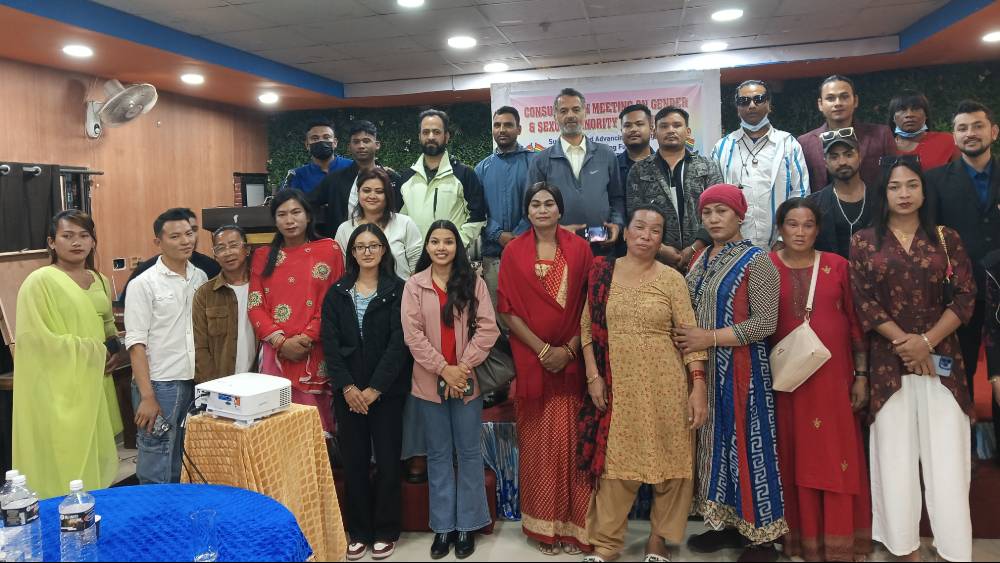
Kathmandu : Nepal has made significant progress in advancing Gender and Sexual Minority (GSM/LGBTI) rights, including the 2007 Supreme Court ruling recognizing gender-diverse people and the inclusion of GSM categories in citizenship documents. However, despite these legal gains, GSM communities still face economic struggles, political exclusion, and increasing discrimination fueled by anti-GSM movements.
The GSM movement is also experiencing a funding crisis due to cuts in international aid, including USAID, and shifting donor priorities. This has left many community members unemployed and struggling financially. Participants highlighted the need for self-sufficiency instead of relying solely on donor funding.
At the consultation, speakers emphasized economic empowerment, social enterprises, and political inclusion as essential strategies to sustain progress. The discussion also covered the lack of representation in policymaking, restrictive laws, and discrimination in areas like employment and foreign labor opportunities.
Key Discussions
MayaKo Pahichan Nepal’s Executive Director, Sunil Babu Pant, recalled the early struggles of the movement, from distributing condoms in Ratna Park to founding Nepal’s first registered LGBTI organization in 2001 despite legal barriers. He stressed that while the fight for recognition has succeeded, economic empowerment is the next crucial step.
Pant pointed out that GSM individuals still face legal discrimination, including being excluded from inheritance rights and protection from sexual violence. He also called for amendments to at least 21 discriminatory laws and for quota-based employment opportunities in countries that support GSM/LGBTI rights.
Madhu Sunam from the National Human Rights Commission highlighted the commission’s advocacy for GSM inclusion in Nepal’s census and legal reforms to protect their rights. Indra Bilas Paudel, Secretary of the House of Representatives Women and Social Committee, stressed the lack of GSM representation in parliament and the need for stronger policy advocacy.
Sangeeta Dutaraj from Samata Foundation called for affirmative action and equal treatment of GSM individuals. Dinesh Raj Pathak of ActionAid Nepal acknowledged the impact of declining donor support on GSM organizations and emphasized the importance of alternative economic strategies.
Pushpa Raj Timilsina, a member of the National Inclusion Commission, reaffirmed the commission’s commitment to researching GSM issues and addressing systemic barriers. He noted that despite official statistics labeling GSM individuals as a minority, their challenges remain among the most severe in Nepal.
Constituent Assembly Member Binod Pahadi encouraged the GSM movement to engage in direct action and protests to push for policy change. Other speakers, including representatives from political parties, pledged support for GSM political inclusion.
Santosh Silwal, Janata Samajwadi Party Nepal, said their party constitution has made provision for GSM/LGBTI representation and expressed their full solidarity.
Acknowledgments
MayaKo Pahichan Nepal thanks the National Human Rights Commission, National Inclusion Commission, Ministry of Women, Children, and Elderly Citizens, ActionAid Nepal, Bihani Social Ventures, and Samata Foundation for their commitment to the political and economic empowerment of GSM/LGBTI communities. Special thanks to Binod Pahadi for his support in ensuring GSM representation in upcoming elections and advocating electoral law amendments.
We also extend our gratitude to GiveOut for their financial support in organizing this important consultation. Many GSM community members shared their support for social enterprises and emphasized the need for political representation to create inclusive laws and policies.
Copyright © All right reserved to pahichan.com Site By: Sobij.